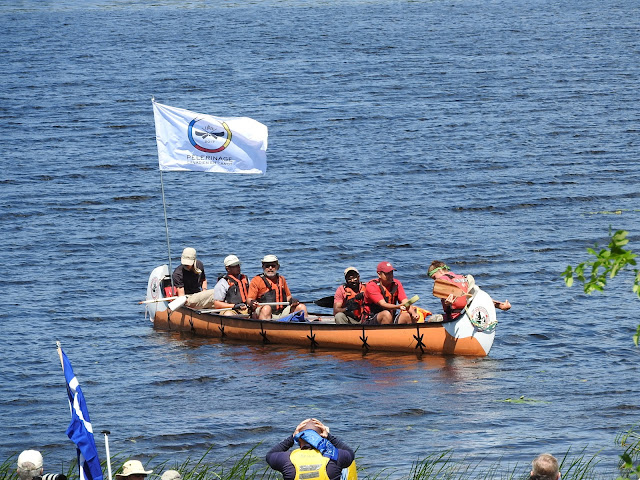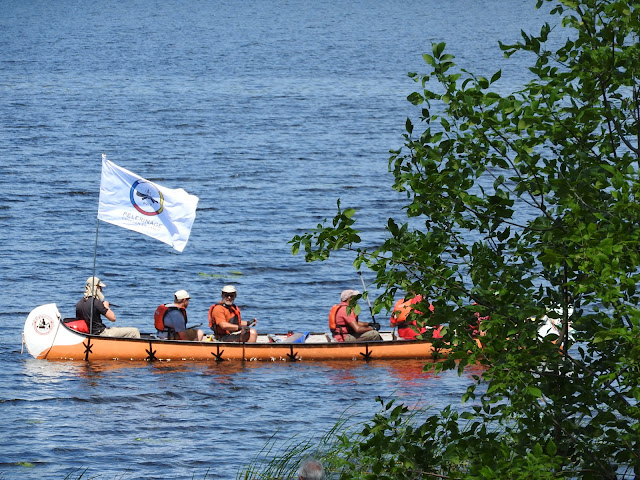On 21 July 2017, a group of thirty men and women began a canoe pilgrimage of some 800 kilometers, inspired by the Calls for Action of the Truth and Reconciliation Commission. They departed from the historic sites of Sainte-Marie among the Hurons and the Canadian Martyrs Shrine in Midland, Ontario, and plan to arrive on 15 August, the Solemnity of the Assumption of the Blessed Virgin Mary, at the First Nations community of Kahnawake, near Montreal, which is also the home of the Shrine of Saint Kateri Tekakwitha and where she is buried. Following the traditional trading route used by the First Nations, as well as the 17th-century Jesuit missionaries and the early European explorers, including Samuel de Champlain, the canoeists have traveled through Georgian Bay, the French River, Lake Nipissing, and then the Mattawa and Ottawa Rivers, and will finish on the Saint Lawrence River.
Working in collaboration with their project manager, Jesuit seminarian Erik Sorensen, the participants are from different parts of the country, representing various Aboriginal groups, religious communities and other organizations. They include Mr. Kyle Ferguson, Advisor for Ecclesial and Interfaith Relations with the Canadian Conference of Catholic Bishops (CCCB), as well as Sister Eva Solomon, from the Henvey Inlet Ojibwe First Nation and a member of the Sisters of St. Joseph of Sault Ste. Marie, who is currently based in Winnipeg and is part of the Building Bridges program founded by the Western Assembly of Catholic Bishops and focuses on Indigenous inculturation and interculturation of faith.
Along their pilgrimage route, the canoeists are being greeted by local parish and Aboriginal communities as well as communities of religious life. Upon their arrival in Gatineau, on 9 August, they were welcomed by the Most Reverend Roger Ébacher, Archbishop Emeritus of Gatineau, on behalf of Archbishop Paul-André Durocher. The next day, the Most Reverend Terrence Prendergast, S.J., Archbishop of Ottawa, welcomed them to Notre Dame Cathedral Basilica for a Eucharistic celebration and a meal, followed by a talk by the Jesuit historian Father Jacques Monet on the history of the route they are following.
The Canadian Canoe Pilgrimage (CCP) is a project inspired by Canada’s Truth and Reconciliation Commission (TRC) with the hope of encouraging intercultural and interreligious dialogue and learning. Participants, both Indigenous and non-Indigenous, will be immersed in each other’s customs and traditions. Through this immersion, the goal is to foster respect, trust, dialogue, and hopefully friendship — the building blocks for reconciliation. The canoe route is a traditional First Nations trading route that was travelled by early European settlers such as Samuel de Champlain and Jean de Brébeuf, who were welcomed and guided by the Indigenous Peoples of this land. This pilgrimage will begin at Sainte-Marie among the Hurons in Midland, on the shore of Georgian Bay, on July 21 and end on August 15 on the St. Lawrence River at the Kahnawake First Nation, close to Montreal. The community of paddlers making this 850-kilometre, 25-day voyage is comprised of Indigenous Peoples, Jesuits, English and French Canadians, men and women – all desiring to travel together on a path of healing and friendship. The route follows a similar one paddled by 24 young Jesuits in 1967. For more information, and to donate, please go to the Canoe Pilgrimage website. |


























